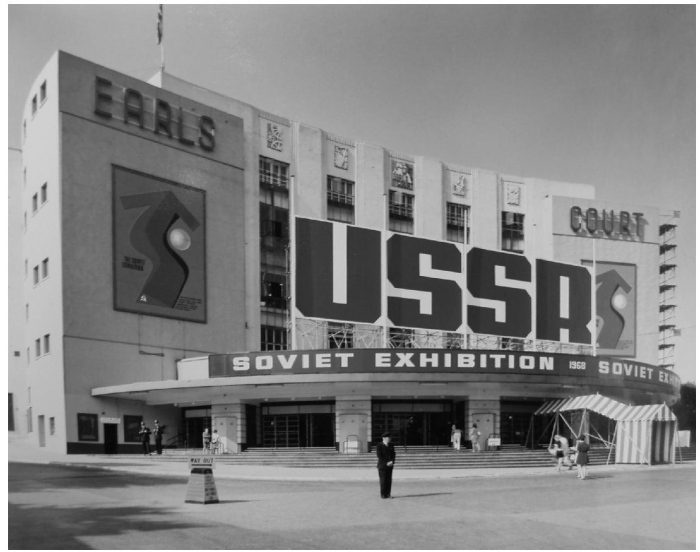
Socialist Exhibition Cultures
Wednesday March 13, 11.30am-1pm EST.
Conveners: Polly Savage (main), Sven Spieker, Bojana Videkanic
This workshop will focus on the research project and forthcoming Handbook of Socialist Exhibition Cultures edited by Sven Spieker with Polly Savage and Bojana Videkanic, with particular focus on the multi-authored introductory text.
The Handbook examines global art exhibitions organized, between 1950 and 1990, in or by (formerly) socialist or Communist countries, including the Soviet Union and other Communist/socialist states in Eastern Europe; China; North Korea; South Korea; Cuba, and Africa, including Mozambique, Ethiopia, and Angola. We consider Cold War socialist exhibitions instances of a curatorial culture that developed as an alternative to the Western art market and its international outlets, and according to its own set of demands and prerogatives. By treating global exhibition history both within a national context and transnationally, the project proposes a paradigm shift in how we view the Cold War, shedding light on the way Socialism during this time allowed for cooperation and exchange between the Second and the Third World.
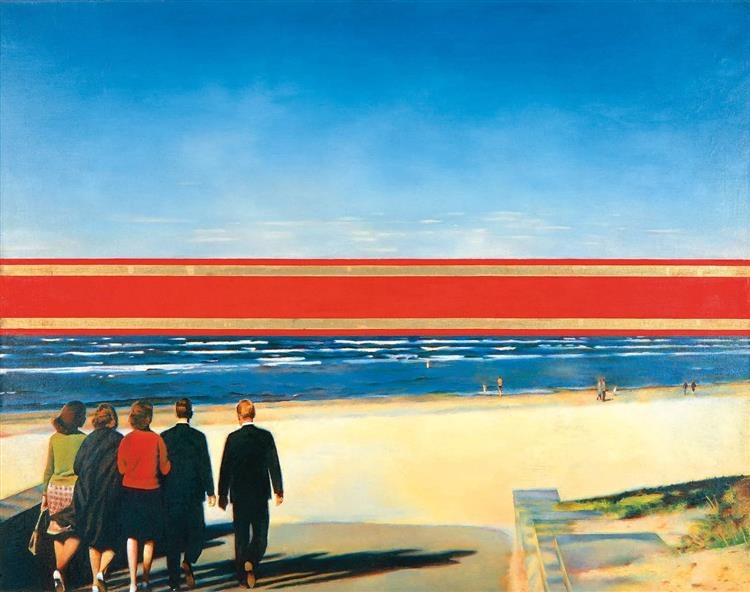
Erik Bulatov, Horizon, 1971-72
“The Ocean in Socialist Studies”
Friday, December 8, 2023, 11.00AM – 12:30PM EST
Conveners: Douglas Gabriel and Nico Volland
The emerging field variously called the Blue Humanities, archipelagic studies, and oceanic studies, calls on scholars in the humanities and social sciences to critically interrogate the epistemic models and analytical categories informing our research. Rather than focusing on continents and their supposedly stable borders, water-based ontologies propose fluidity, relationality, and increasingly also embodied experiences and engagement with the ocean. Maritime histories, archipelagic approaches to literature, memory, and diaspora, as well as studies of “wild blue media” are transforming a wide range of disciplinary practices.
Where is the ocean in socialist studies? Can socialism take to the seas? The American empire in the Pacific has been characterized as an archipelago of bases and alliances. Did the socialist world ever get their feet wet? Are there socialist cultures that dip their toes into the waters (or maybe even ride the waves)? This session is a provocation, calling on members to explore what studies of world socialist cultures and the blue humanities may have to say to each other (if anything). The conveners propose to jumpstart our discussion with a set of primary texts and visual materials from the People’s Republic of China and North Korea. In “Sons and Daughters of Hsi-sha” (1974), the novelist Han Ran leaves the firm ground of rural revolution and dives into the raging South China Seas. Meanwhile, a short presentation by Douglas Gabriel will explore how the seas have been depicted in North Korean paintings and infused with anti-imperialist sentiments. We propose these materials as a starting point for, hopefully, broader reflections that could and should include case studies from other geographic and temporal contexts.
.

“Facing the Archive: Reading Declassified Eastern Bloc Documents Along and Against the Grain”
Wednesday, November 8, 2023, 11.00AM – 12:30PM EST
Guest Conveners: Sara Blaylock (University of Minnesota, Duluth) and Cristina Vatulescu (NYU).
This session engages with a set of questions surrounding the functions of archives of state power produced in the Eastern Bloc. What have we learned about reading secret documents three decades after the storming of the Stasi archives by German protesters? What archival theories and practices help scholars and artists face the bureaucratic traces of power in the Eastern Bloc while also recognizing their deficiencies?
In her remarks, Sara Blaylock will describe her use of the Stasi archives in research on artists from the former East Germany who have used surveillance records in their work. She will relate her methodology to one modeled by Ann Laura Stoler’s research into the post-colonial archives of the former Dutch Indies. Cristina Vatulescu will identify the challenges of reading these archives and will trace a range of archival theories and practices that can be activated to tackle these challenges.
.
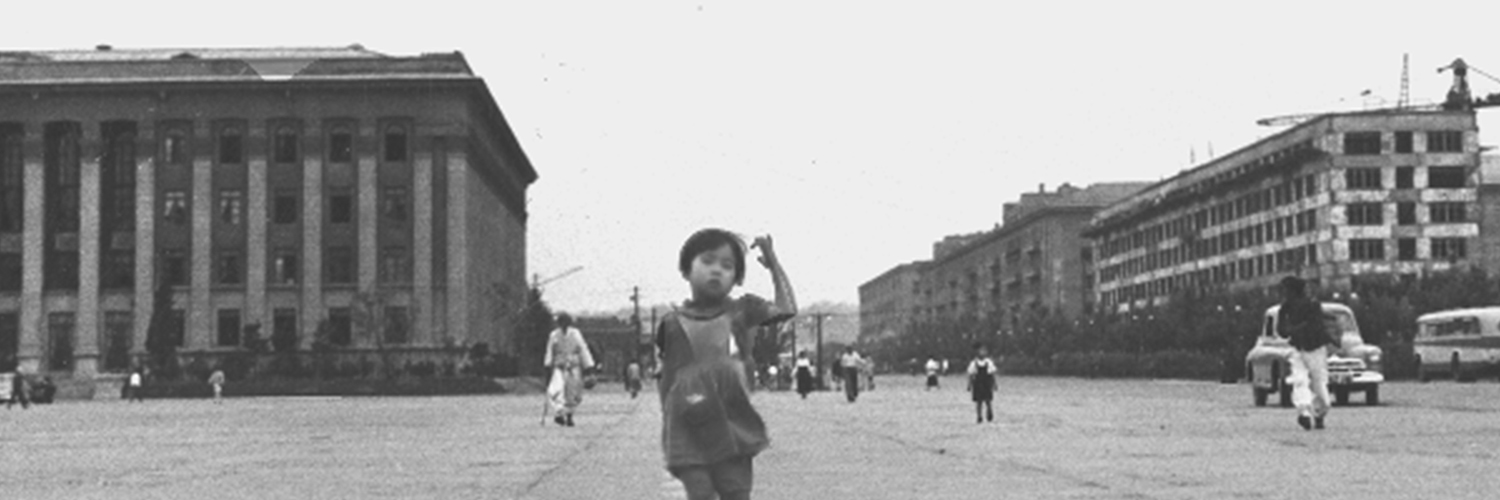
“Red Networks: Post-War Art Exchange”
Friday, March 10, 2023, 12.30PM – 2PM EST
Presenters: Vivian Li (Dallas Museum of Art), Nora Annesley (School of the Art Institute of Chicago), Douglas Gabriel (Seoul National University), Adri Kácsor (Northwestern University), Klara Kemp-Welch (University of London), Raino Isto (University of Maryland, College Park), Sohl Lee (Stony Brook University).
This workshop reflects upon a special issue of Art History, which critically revisits the often-overlooked institutional circulations of art and art professionals, exhibitions, and other forms of cultural production within the Communist sphere from the late 1940s to its peak in the early 1960s during de-Stalinization, and eventual departure by the 1980s from the international ambitions of a ‘socialist’ globalism. As this collection of essays underscores, while the promise of ‘friendship’ and ‘solidarity’ in socialist internationalism offered a variety of transnational opportunities for art and artists, at the same time these complex concepts were also dependent on an unevenness of power, and not necessarily only with the Soviet Union.
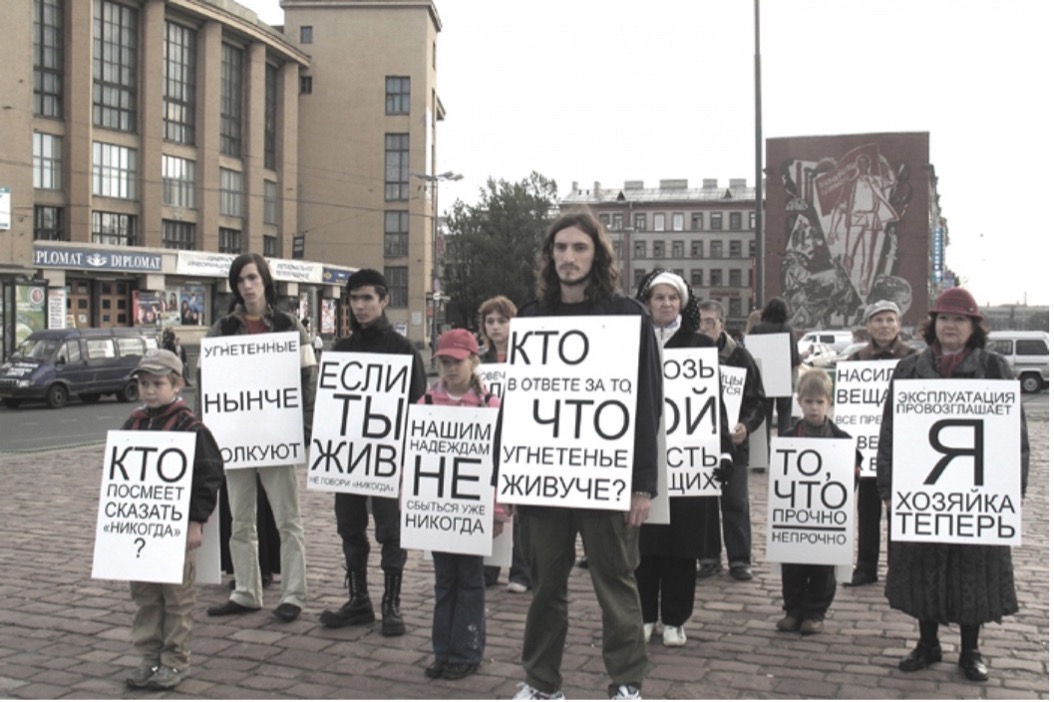
“Uneven and Combined Development in Slavic and East European Culture”
Friday, March 10, 2023, 12.30PM – 2PM EST
Presenters: Djordje Popović/Lilla Balint (UC Berkeley); Zach Hicks (UC Berkeley); Branislav Jakovljević (Stanford); Dominick Lawton (Stanford); Katja Perat (Iligsavik College)
The theory of uneven and combined development (UCD), in its various formulations from Marx, Lenin, and Trotsky through the more contemporary work of Immanuel Wallerstein, Giovanni Arrighi, and the Warwick Research Collective, opens a perspective on culture that grasps the world in its totality and does so because of—not despite—the irregularities manifest in its historical development. Geographers and world-systems theorists have focused on the spatial dimension of UCD to map global social relations in terms of periphery, semi-periphery, and core. No less important, however, is the temporal conception of UCD: a philosophy of history that perceives the “synchronicity of the non-synchronous” (in Ernst Bloch’s terms) in the simultaneous coexistence of “archaic” and “modern” cultural forms produced by the variable dynamics and topography of the modern economy (for example in the work of Harry Harootunian or Benita Parry).
Though our individual contributions address different times, places, and often media, all our work returns to the part of the world in which UCD was first articulated: East Europe, the most geographically immediate periphery of Europe’s imperial core. Our goal is to consider how UCD shapes the region’s cultural forms—-national traditions, genres, individual works—-and, conversely, how artistic production gives form to the phenomenon of UCD. Rather than searching for uniquely East European modern/ist phenomena, we identify how global modernity, as such, came into being in East Europe; the truth that “revealed itself” in the so-called “destiny of the backward countries”—to use Trotsky’s own expression—had nothing to do with “destiny” or “backwardness,” and was instead directed precisely against historical inevitability, cultural particularism, and the core leading the periphery.
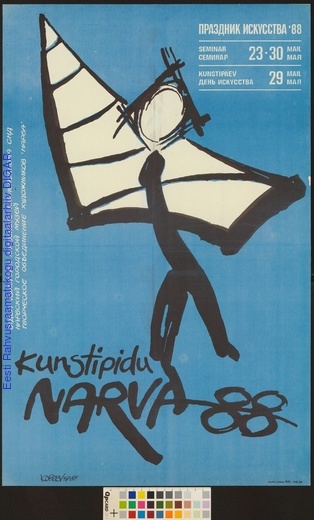
“Narva 1988: Art-Work and Unruly Collectivities at Last Soviet Festival”
Wednesday, January 25, 2023, 12.30pm-2pm EST
Conveners: Leah Feldman
This Workshop will discuss a chapter is part of Leah’s book manuscript, Feeling Collapse, which reexamines late Soviet unofficial visual and performance art from the Caucasus and Central Asia during the collapse of the Soviet Union in the 1980s and early 1990s. I am interested in how feelings – in the sense of both emotions and sensations – index waning attachments to an idea of the Soviet good-life, Soviet multinationalism, and socialist internationalism amid the collapse. Feeling Collapse also asks how these waning attachments emerged alongside forms of authoritarian ethno-nationalism. Examining performance, video and installation art from the Caucasus and Central Asia, I explore how this work produced a repertoire of emotions and sensations about the socio-political and economic transition. The works tend to turn away from a symbolic visual hierarchy attached to a spectacular Soviet statehood and instead engage experiments with other sensations—tactility, rhythm, and sensing others in space.
The chapters are as follows: 1. Feeling Timeless: The Suspended Temporalities of Parajanov’s Collage Aesthetics takes up sex, gender and internationalist feelings in the work of Sergei Parajanov; 2. **Narva 1988: Art-Work and Unruly Collectivities at Last Soviet Festival (chapter manuscript included); 3. Feeling Stateless: Rustam Khalfin’s Nomad Thought discusses spectacular statehood and the shift from Soviet multinationalism to post-Soviet nationalism through the framework of Eurasianism in Kazkhstan. The chapter focuses on the video art of Rustam Khalfin and his work with hapticity; 4. Feeling Worldly: The Ilkhom Theatre’s Improvisations of Socialist Internationalism discusses the Soviet World Literature project through the Ilkhom theatre’s adaptations of World Literature classics for the Tashkent stage as currency for socialist internationalist feelings. It focuses in particular on adaptations of Steinbeck’s Tortilla Flat, Abdulla Qodiri’s Kalvak Mahzum’s Notebooks in their production Black, Black, White Stork, as well as Pushkin’s Evgenii Onegin and Imitations.
“Anti-Imperialist Art in Post-Soviet Spaces”
Friday, November 18, 11am-12.30pm EST
Conveners: Amelia Glaser, Kevin Platt
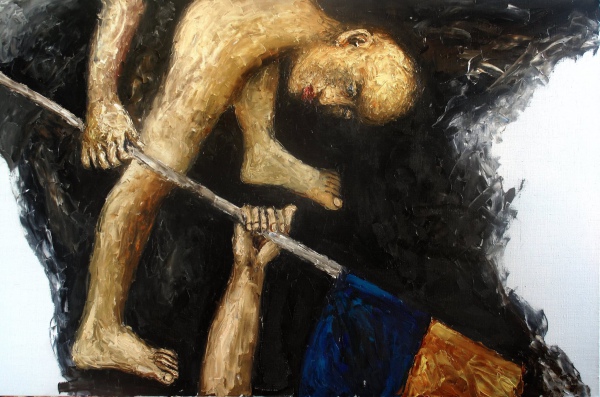
Oleksandr Roytburd, “Raising the Banner” (Поднимающий знамя), 2014
In this session, Kevin and Amelia will focus on recent art and poetry in Eastern Europe outside Russia, and how these writers negotiate a post-Soviet and post- or neo-imperial space. Kevin Platt will share a chapter from his book in progress on Russian-language art cultural projects in post-Soviet Latvia. Amelia Glaser will share an article drawn from her ongoing project on Ukrainian poetry and community since 2014.
Readings:
- A chapter from Kevin’s work in progress
- Poems by the ORBITA group that help add context to Kevin’s chapter
- Amelia’s article in progress
- Poems by Kiyanovska that help illustrate Amelia’s article
Note on the Readings: The poems themselves will be covered in our introductions, but these will help to fill in some background.
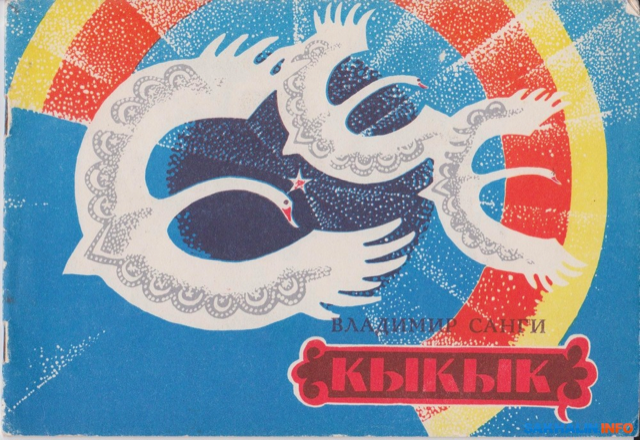
“Communist World Poetics”
October 5, 12:00 PM-1:30 PM EST
Convener: Sam Hodgkin
In recent years, the conventional polarities of world literature studies, which model institutionalized world literature as a phenomenon emerging from literary transactions between the Western metropolis and the colonial peripheries, have been complicated by a number of studies focused on the communist bloc and on leftist literary internationalisms in the decolonizing world. These studies have begun to construct a new institutional history of world literature, in which communist writers’ organizations and their journals of literature in translation defined the early infrastructure for non-European writers to claim a place in world literature, whether considered as a symbolic system or a practical publishing network. Furthermore, the Soviet multinational literary system, with its writers’ unions, plenums, periodicals, and petitions, provided a model for a range of national and international literary organizations, whose politics were not always pro-Soviet or even leftist.
The emergence of this counternarrative gives us an opportunity to consider communist world literature as an intelligible unit beyond the history of literary institutions, that is, to consider the distinctive poetics that emerged within this system. This task differs from the more ubiquitous tradition of scholarship that focuses on the political dimension of Soviet and Soviet-aligned high modernism, which preceded the emergence of large-scale non-Western communist literary internationalism. More relevant is a strain of recent scholarship that has reconsidered the turn away from literary high modernism in the global 1930s, and the broader politics and poetics of “peripheral realisms.” As a primarily recuperative project, however, this line of investigation has set aside the less appealing characteristics of global “party literature”: its modularity, instrumentality, and the synchronization of literature with bureaucracy. These are, however, among the most crucial legacies that communist world literature bequeathed to the globalized postcolonial literature of the present day. They continue to shape how writers, publishers, and readerships represent and imagine collectivities, national and otherwise.
“Art, Cultural Diplomacy and the ‘Global South’”
April 28, 12.30PM-2PM EST
Conveners: Christine Ho, Cristian Nae
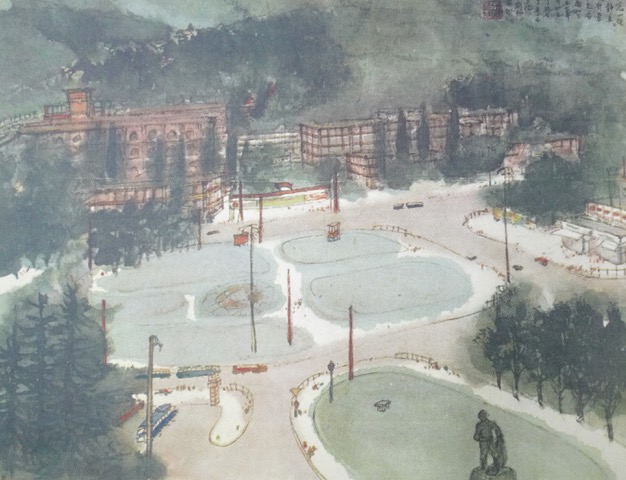
From Fu Baoshi, Albums of Visits to Czechoslovakia and Romania (1957)
This session focuses upon the role of exchange exhibitions in producing the geographies and structures of knowledge of socialist globalization, or what has been described the “South as Method.” In exploring connections between Eastern Europe, Asia, and Africa, the session asks: how do exchange exhibitions suggest alternative ways of thinking about the relationship between nationalism, transnationalism, socialist internationalism, and globalization? How did exchange exhibitions broker new modes of encounter and exchange, especially toward new forms of cultural independence? Finally, how might exhibitions map modes of connection that contested cultural imperialism? While exhibitions have received renewed focus in the last few years under the age of Biennales, this session will move beyond the rhetoric of official claims to examine cultural translations and mistranslations.
Reading Materials
- Theodora K. Dragostinova The Cold War from the Margins: A Small Socialist State on the Global Cultural Scene (Cornell UP, 2021). Chapter 5
- Anthony Gardner and Charles Green, “Biennales of the South on the Edges of the Global,” Third Text 27, no. 4 (2013): pp. 442–455.
- Supplementary primary sources: Fu Baoshi, Albums of Visits to Czechoslovakia and Romania (1957)
“The Many Faces of Socialist Leader Portraits”
March 4, from 12.30PM-2PM EST
Presenters: Douglas Gabriel, Yi Gu
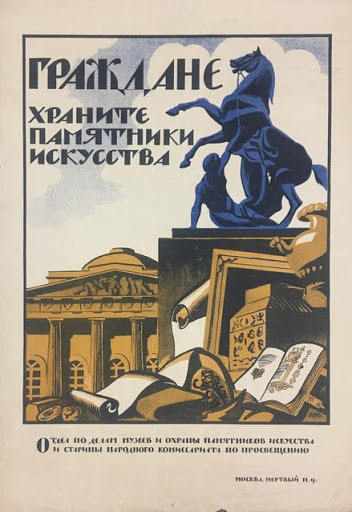
This meeting will confront a cross-section of socialist leader portraits, a genre deemed by Igor Golomstock to constitute the most privileged of themes in the topography of totalitarian art. More than classifying the similarities and divergences that present across different iterations of leader portraits, our chief aim will be to track how the circulation and appropriation of such images have, at different junctures, unsettled their perceived rigidity. Seen from this angle, one and the same portrait might be shown to operate simultaneously as a brutally oppressive signifier in one context, and as a marker of international solidarity and anti-imperialist commitments in another. Moreover, we will consider leader portraits in an expansive sense, unpacking, for example, the sometimes curious portrayals of a figure like Lenin in a recently translated 1924 memoir-style sketch by Anatoly Lunacharsky recollecting the Soviet leader’s encounters with and musings on various art forms.
A presentation by Douglas Gabriel will explore the diverse employment of Kim Il Sung portraits in the Black Panther newspaper in the 1960s. A text by Eldridge Cleaver reflecting on a visit to Pyongyang serves as a supplement to the presentation, and as another instance of a textual leader portrait, this time in the form of a missive intended to be reprinted across multiple platforms and circulated internationally. A second presentation by Yi Gu will examine official portraits of Mao and their scholarly evaluation.
Reading Materials
- Barme, Geremie. Shades of Mao: The Posthumous Cult of the Great Leader. Armonk, NY: M. E. Sharpe, 1996. PLEASE READ PP. 39-54
- Galimberti, Jacopo, Noemi de Haro Garcia, Victoria H. F. Scott, and Marsha Meskimmon. Art, Global Maoism and the Chinese Cultural Revolution. Manchester University Press, 2021. PLEASE READ INTRODUCTION ONLY
- Lunacharsky, Anatoly. “Lenin and Art.” In Khudozhnik I Zritel [Artist and Audience], issues 2-3 (March-April 1924), translated by Reuben Woolley, 2021. Available open access: https://cosmonaut.blog/2021/01/21/lenin-and-art-by-lunacharsky/
- Cleaver, Eldridge. “We Have Found It Here in Korea.” Black Panther, November 1, 1969, 11.
“Hegemony and Subalternity”
February 10, from 12.30PM-2PM EST
Conveners: Karen Benezra, Sven Spieker
Presenters: Karen Benezra, Polly Savage, Sven Spieker
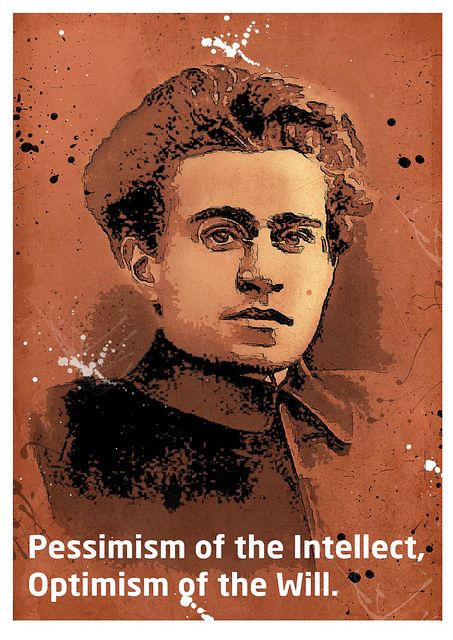
The session deals with the problem of subaltern and popular culture in Gramsci’s recently translated Notebook 25 (1934) and in Amílcar Cabral’s “National Liberation and Culture” (1970), complemented by Pier Paolo Pasolini’s poem “The Ashes of Gramsci” (1954) whose last section (VI) develops its own idiosyncratic take on subalternity. Together with Peter Thomas’s forceful and polemical reinterpretation of Gramsci’s theory of the state, Gramsci’s mature thinking on culture and politics provides a framework for approaching the relationship between hegemony and subalternity–and the role of art and ideology within it–first staged in his earlier formulations “On the Southern Question” and on the concept of the “national-popular.” In his 1970 speech, Bissau-Guinean anti-colonial leader Amílcar Cabral takes up these ideas to denounce the cultural violence of colonial rule, and outline future cultural strategies for the liberation struggle. Pasolini’s poem, for its part, has the poet profess an attraction to mythical, premodern proletarian life and culture, both alongside and against Gramsci’s de-mythifying project. Short presentations by Karen (Notebook #25); Polly (Cabral); Sven (Pasolini).
“Modernism and Socialist Realism”
December 3, from 12.30PM-2PM EST
Conveners: Sven Spieker, Monica Popescu, Christine Ho
Presenters: Kevin Platt, Łukasz Stanek
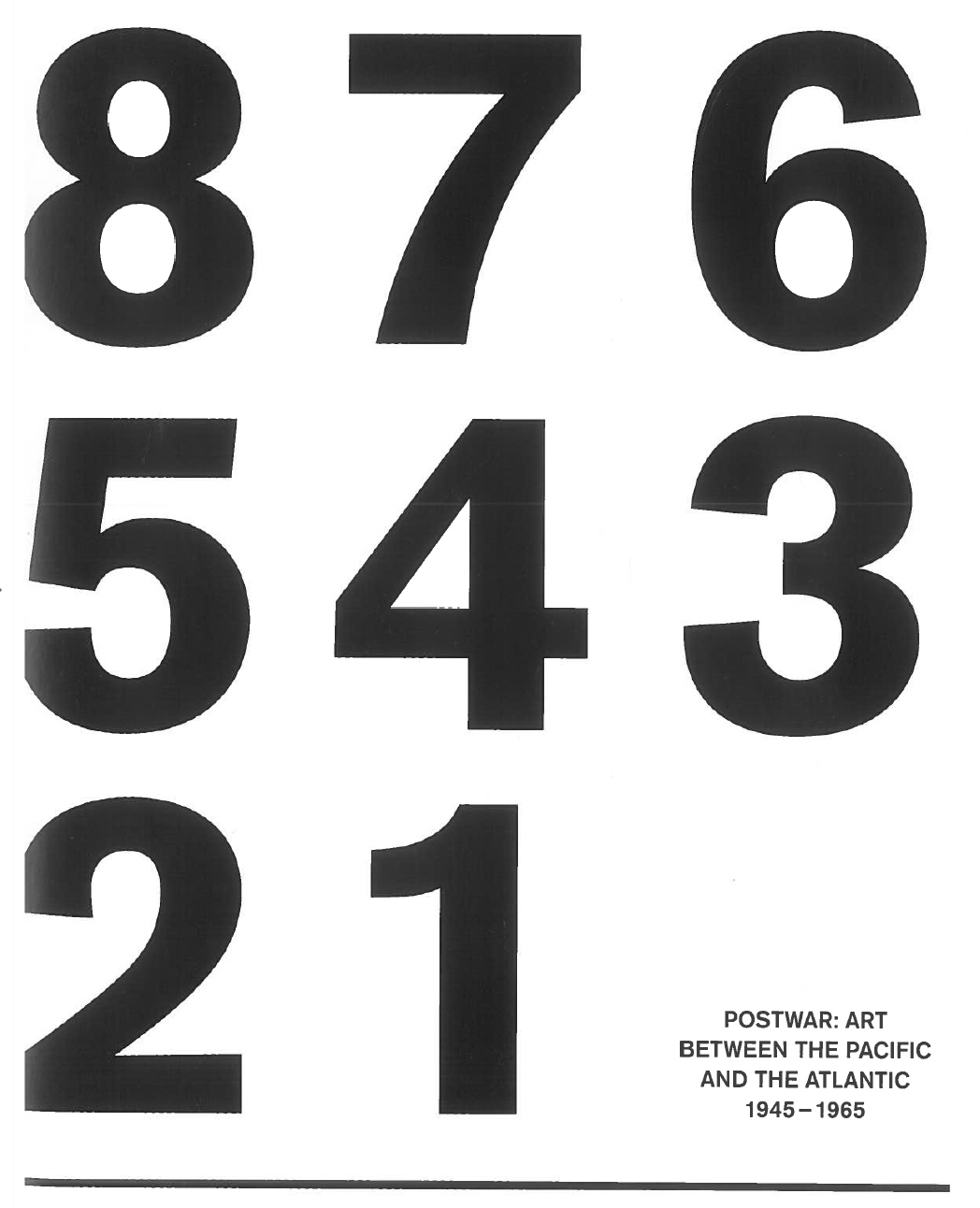
“How To: Manuals for Mass
Mobilization in Literature and Art”
September 30, 2021 @ 12.30pm-2pm EST
Curator: Sam Hodgkin & Presenter: Yi Gu

Literature Lesson at the school associated with the Krasnyj Bogatyr Factory (early 1930s).
The workshop will consider translated selections from manuals produced in the 1920s to train Soviet Russian and Uzbek worker-correspondents and peasant-correspondents, some of them newly literate, to write essays, poetry, and prose fiction for publication in newspapers and journals. The foundational Uzbek literary reformer ‘Abd al-Ra‘uf Fitrat (1886-1938) The poets Georgy Shengeli (1894-1956) and Vladimir Mayakovsky (1893-1930) engaged in a bitter polemic about literary training, and their manuals (both from 1926) present two very different conceptions of what you need to know to start writing poetry. A 1927 manual by the Uzbek proletarian writer Anqabay (Khudayvahidov, 1905-1938) draws on Fitrat and Shengeli’s manuals, while transforming Futurism, too, into a masterable set of poetic techniques. Each of the texts imagines, in its own way, a process of literary cadrification capable of producing a proletariat that writes for itself without intelligentsia guidance or mediation. Yi Gu will start the discussion with a presentation of her own research on manuals and training programs for amateur artists in Maoist China.
“Objects of World Socialism”
September 17, 2021 @ 12.30pm-2pm EST
Curators: Samuel Hodgkin, Sven Spieker
Presenters: Samuel Hodgkin, Sven Spieker, Group Members
This meeting aims to introduce the Working Group members to each other. After a short introduction we are hoping that each member of the Group might briefly present an object of their choice, to give everyone an idea of their current research interests.
